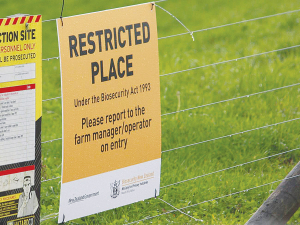We must keep our foot on the pedal
OPINION: Last week marked a major step forward in our work to eradicate Mycoplasma bovis.
 OSPRI has taken over day-to-day operational and disease control functions of the M. bovis programme.
OSPRI has taken over day-to-day operational and disease control functions of the M. bovis programme.
From this month OSPRI took over day-to-day operational and disease control functions of the Mycoplasma bovis (M. bovis) programme.
This means OSPRI will now be responsible for testing farms, the two background surveillance programmes, managing the current active confirmed property and any newly detected farms, depopulation of infected farms, or trace animals and supporting affected farmers.
Programme partners, Ministry for Primary Industries (MPI), Beef + Lamb New Zealand and DairyNZ, will continue to govern and monitor the programme's progress. MPI will retain non-operational aspects of the programme, including compensation, and any necessary compliance action.
OSPRI says the change does not affect farmers and M. bovis levies will not change.
The programme is now more than halfway into an estimated 10-year plan to eradicate M. bovis. The number of infected properties has fallen to very low levels and the major activity of the programme in coming years will be national surveillance of New Zealand's cattle herd. Moving operations from MPI to OSPRI at this stage of the eradication effort is said to provide the best value for the programme funders and farmers.
OSPRI says its proven regional management model reflects its experience in surveillance and disease control.
“The natural synergies between the M. bovis programme and our NAIT and the TBFree programmes will help us achieve operational efficiencies.
“A significant portion of our M. bovis team is coming over from MPI, bringing invaluable programme knowledge to our organisation.”
The M. bovis programme is being administered under a Government Industry Agreement (GIA) between the three partners.
A proposal is under way to change the administration model to a National Pest Management Plan (NPMP) — the same model used for bovine tuberculosis (TB). The proposal nominates OSPRI as the lead agency to deliver the programme for the remainder of the eradication plan.
Public submissions on the draft proposal closed in October 2023. The final proposal is expected to be submitted to the Government for review in 2024.
The World Wide Sires National All Day Breeds Best Youth Camp Best All Rounder plaudit has become family affair, with 2026 Paramount Cup winner Holly Williams following in her sister Zara's footsteps.
DairyNZ is giving New Zealand farmers a unique opportunity to gain hands-on governance and leadership experience within the dairy sector.
Herd improvement company LIC has posted a 5.2% lift in half-year revenue, thanks to increasing demand for genetics.
According to the latest Fresh Produce Trend Report from United Fresh, 2026 will be a year where fruit and vegetables are shaped by cost pressures, rapid digital adoption, and a renewed focus on wellbeing at home.
The Roar is a highlight of the game hunting calendar in New Zealand, with thousands of hunters set to head for the hills to hunt male stags during March and April.
OPINION: The past few weeks have been tough on farms across the North Island: floods and storms have caused damage and disruption to families and businesses.
OPINION: Fonterra may be on the verge of selling its consumer business in New Zealand, but the co-operative is not…
OPINION: What does the birth rate in China have to do with stock trading? Just ask a2 Milk Company.